Help desk software pricing varies significantly based on the number of users, included features, and contract length. See our pricing comparison below for a detailed breakdown:
| Helpdesk | Pricing | |
|---|---|---|
1. | Lowest cost starter plan for monthly subscription | |
2. | Pricing highly varies, extensive feature tiers | |
3. | Enterprise-scale support with flexible tiered pricing | |
4. | Lowest cost starter plans for annual subscription | |
5. | Hybrid: Subscription + per-resolution | |
Freshdesk
Freshdesk offers 4 different plans and paid add-on tools:

Source: Freshworks1
Table 2: Freshdesk plans
| Billing type | Free | Growth | Pro | Enterprise |
|---|---|---|---|---|
| Annuall billing | – | $15 | $49 | $79 |
| Monthly billing | – | $18 | $59 | $95 |
Annual and monthly billing rows represent agent/month pricing.
- Growth: Basic support with essential ticketing and email features for SMEs.
- Pro: Greater customization and customer segmentation options for personalized support.
- Enterprise: Featured with bots and multi-channel support channels for enterprise-level support
Freshdesk add-ons
Freshbots by Freddy Self Service – $100 for 1000 Freshbots sessions: Engage with customers 24/7 using Freshbot sessions on email and voice; see FAQs channels.
Freddy Copilot – $29/agent/month, billed annually: Freddy Copilot can summarize issues, suggest next steps, and handle repetitive tasks.
Freshcaller – $15/agent/month (growth plan), billed annually: Freshcaller is a cloud-based phone system that makes calls over the Internet.2
For more, see our research about help desks:
Zendesk Support Suite
Zendesk Support Suite offers pricing plans under 2 categories:
2.1. All-in-one solutions

Source: Zendesk Support Suite3
Table 3: Zendesk Support Suite plans
| Billing type | Suite Team | Suite Growth | Suite Professional | Suite Enterprise |
|---|---|---|---|---|
| Annuall billing | $55 | $89 | $115 | $169 |
| Monthly billing | $69 | $115 | $149 | $219 |
Annual and monthly billing rows represent agent/month pricing.
- Suite team: Basic conversational service with quick setup for SMEs.
- Suite Growth: Increased self-service and automation capabilities at a scale.
- Suite Professional: Featured with collaboration tools, skill-based ticket routing, and analytics.
- Suite Enterprise: Personalized experience at scale with content suggestions and customizable roles and permissions.4
Table 4: Compare plans
| Features | Suite Team | Suite Growth | Suite Professional | Suite Enterprise |
|---|---|---|---|---|
| Multilingual content | 1 default language | 40+ languages | 40+ languages | 40+ languages |
| Multiple help centers | 1 | Up to 5 | Up to 5 | Up to 300 |
| AI agents resolutions per agent/month | 5 | 10 | 10 | 15 |
2.2. Build your own plan
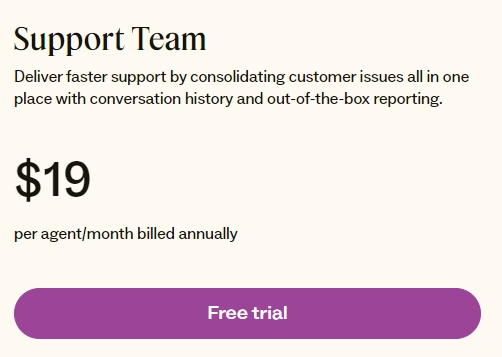
Source: Zendesk5
Build your own plan starts from $19 per agent/month billed annually. This plan is suitable for small businesses that deal with a low number of tickets and that do not require analytics.
The plan includes the following default features with an option to add more features:
- Ticketing system
- Email, X, and Facebook messaging
- Customer details and conversation history
- AI agents
- Reporting and analytics
- Eligible for workforce management add-on
- Eligible for quality assurance add-on
Zendesk Support Suite add-ons:
Zendesk Workforce Management $25 per agent/month, billed annually: Workforce management (WFM) is a tool designed for enterprises with forecasting needs. WFM offers historical information on team performance and capacity. It offers:
- Forecasting
- Automatic agent scheduling
- Agent activity tracking
- Agent performance reporting
Zendesk Quality Assurance $35 per agent/month billed annually: Automatically evaluate all communications between human and AI agents, channels, and languages. It offers:
- Agent feedback
- Track performance trends
- QA for AI agents
Data Privacy and Protection $50 per agent/month billed annually: Support your compliance by adding an extra layer of protection and privacy. It offers:
Salesforce Service Cloud
Salesforce Service Cloud offers 5 different plans and paid add-on services:

Source: Salesforce6
Table 5: Salesforce Service Cloud plans
| Billing type | Starter Suite | Pro Suite | Enterprise | Unlimited | Einstein 1 Service |
|---|---|---|---|---|---|
| Annuall billing | $25 | $100 | $165 | $330 | $500 |
| Monthly billing | $25 | – | – | – | – |
The pricing structure is based on agent/month pricing.
- Starter Suite: The simplest CRM package for marketing, sales, support, and commerce.
- Pro Suite: The flexible CRM suite with additional marketing, sales, support, and commerce functions such as real-time chat and sales forecasting.
- Enterprise: More tailored plan with AI recommendations, and workflow automation.
- Unlimited: High-end plan for enterprises that need intelligent chatbots and 24-hour assistance.
Table 6: Compare plans
| Top features | Starter Suite | Pro Suite | Enterprise | Unlimited | Einstein 1 Service |
|---|---|---|---|---|---|
| Omni-channel routing | ❌ | ✅ | ✅ | ✅ | ✅ |
| Knowledge management | ✅ | ✅ | ❌ | ✅ | ✅ |
| Einstein for service | ❌ | ❌ | Available for purchase | Available for purchase | ✅ |
| Service intelligence | ❌ | ❌ | Available for purchase | Available for purchase | ✅ |
Salesforce Service Cloud add-ons
Einstein for Service from $75/user/month: Use conversational, predictive, and generative AI incorporated into the workflow to provide personalized assistance.
Visual Remote Assistant $50/user/month: Leverage real-time visual video service.
Service Intelligence from USD 220/user/month: Access AI-powered recommendations and insights.7
Zoho Desk
Zendesk Support Suite offers pricing plans under 2 categories:
4.1. All-in-one solutions
Freshdesk offers 3 different plans:
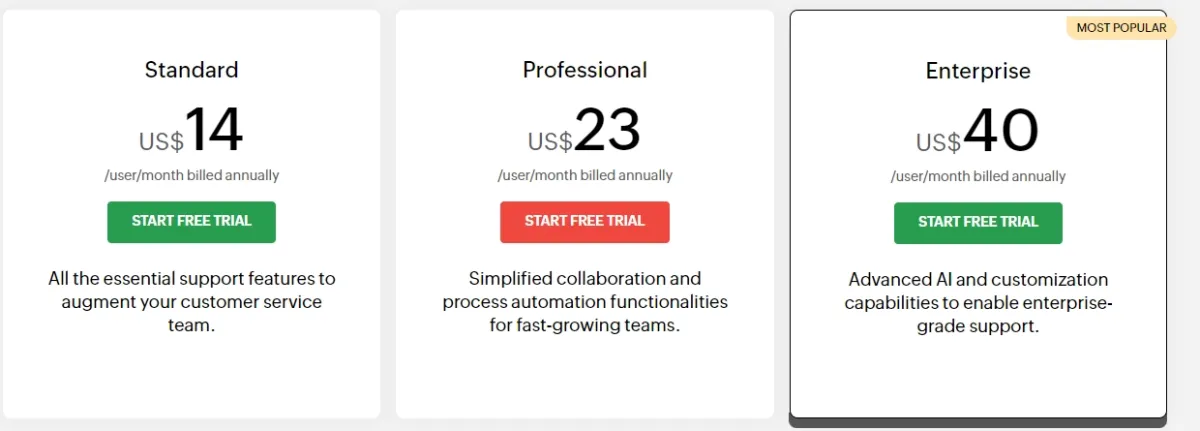
Source: Zoho Desk8
Table 7: Zoho Desk plans
| Standard | Professional | Enterprise | |
|---|---|---|---|
| Annuall billing | $14 | $23 | $40 |
| Monthly billing | $20 | $35 | $50 |
Annual and monthly billing rows represent agent/month pricing.
- Standard: Basic support features such as ticket management with limited automation for small-scale companies.
- Professional: Greater collaboration and process automation functionalities with custom reporting and access level controls for mid-sized fast-growing companies.
- Enterprise: AI agents and customization capabilities for enterprise-level assistance.
Table 8: Compare plans
| Top features | Standard | Professional | Enterprise |
|---|---|---|---|
| Custom reports | 50 | Unlimited | Unlimited |
| AI agent dashboards | ❌ | Limited | ✅ |
| Field-level access control | ❌ | ✅ | ✅ |
| Email channels | 5 | 10 | 100 |
| Live chat | ❌ | ✅ | ✅ |
| Ticket tags | 20 | 30 | 50 |
| Macros | 5 | 15 | 30 |
2.2. Express plan

Source: Zoho Desk9
Zoho Desktop Express is a simple service provider for individuals and small teams with basic ticketing, social media, and analytics features. The plan starts from $7/user/month billed annually.
Intercom
Intercom offers 3 different pricing plans and paid add-on services with Fin AI agent available in all plans starting from $0.99 per resolution:
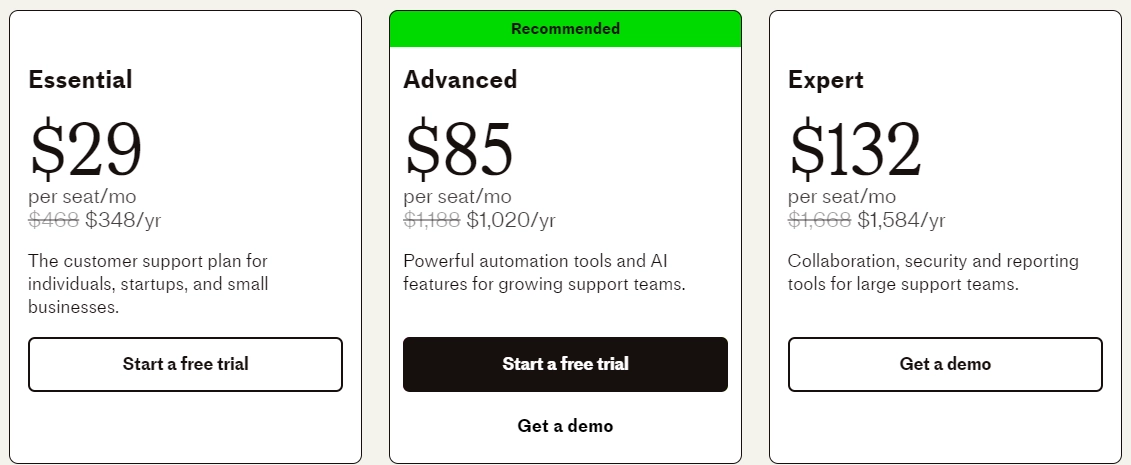
Source: Intercom10
Table 9: Intercom plans
| Essential | Advanced | Expert |
|---|---|---|
| $29 | $85 | $132 |
The pricing structure is based on agent/month pricing, billed monthly.
- Essential: Basic plan for individuals, startups, and small businesses.
- Advanced: Extended plan with automation tools and AI agents for growing technical support teams.
- Expert: Comprehensive plan for team collaboration, enterprise-level security.
Table 10: Compare plans
| Top features | Essential | Advanced | Expert |
|---|---|---|---|
| Workflows automations | ❌ | ❌ | ✅ |
| Custom reports | ❌ | ✅ | ✅ |
| AI compose | ✅ | ✅ | ✅ |
| AI summarize | ❌ | ✅ | ✅ |
| AI autofill | ❌ | ✅ | ✅ |
| Seats for back-office teams | ❌ | 20 | 50 |
Key factors that influence help desk pricing
Number of agents
- The pricing model often scales with the number of users or agents who will be using the software. More users generally mean higher costs.
Features
- Additional features: AI agents, skill-based routing, custom reporting, and analytics, can increase the price.
- Basic packages commonly include essential ticketing and outsourced support for emails, while premium packages offer more comprehensive tools.
Deployment type
- Cloud-based (SaaS) solutions typically have subscription-based models, which might be monthly or annually.
- On-premises solutions may involve a one-time license fee along with ongoing maintenance costs.
Customization
- Solutions that offer higher levels of customization and can scale according to business growth often come at a premium.
- The ability to tailor workflows, add custom fields, and create personalized user interfaces can affect the price.
Customer support
- The level of customer support (e.g., 24/7 support, dedicated account managers) and training provided (e.g., onboarding, user training, and documentation) can influence the cost.
- Service providers may charge extra for extensive support and training packages.
Integration capabilities
- Software that can offer a large number of integrations with CRM, ERP, and other third-party applications) may be priced higher due to the added value and convenience.
Security and compliance
- Additional security features (e.g., encryption, single sign-on, compliance with standards like GDPR, and HIPAA) can increase costs.
Contract length and payment terms
- Discounts might be available for annual contract terms.
- Additional services, such as add-on tools in the package, can increase costs.
Vendor selection criteria
- Number of B2B reviews: 4,000+ reviews on G2, TrustRadius, and Capterra software review sites.
- Average rating: Above 4.0/5 on G2, TrustRadius, and Capterra software review sites.
- Employee size: 1,000+ employees on Linkedin.
- Sorting: With sponsored vendors at the top, others are sorted by total number of reviews in descending order.
Further reading
External Links
- 1. Freshdesk Pricing & Plans | Freshworks.
- 2. Freshdesk Pricing & Plans | Freshworks.
- 3. Zendesk Pricing | Plans starting from just $55/month.
- 4. Zendesk Pricing | Plans starting from just $55/month.
- 5. Zendesk Support Pricing | Plans starting from just $19 an agent.
- 6. Service & Field Service Customer Service Software Pricing | Salesforce US.
- 7. Service & Field Service Customer Service Software Pricing | Salesforce US.
- 8. Zoho Desk – Preise und Editionen | Flexible kostenlose Testversion.
- 9. Zoho Desk – Preise und Editionen | Flexible kostenlose Testversion.
- 10. Get AI-powered customer service from US$29/mo.


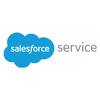
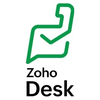



Comments
Your email address will not be published. All fields are required.